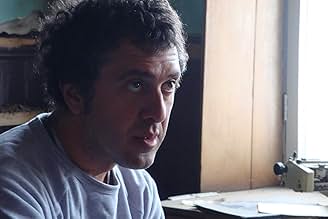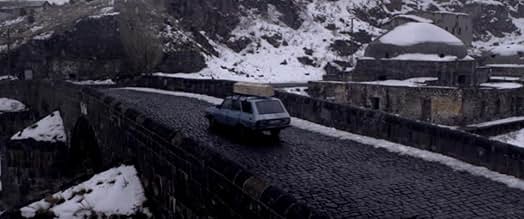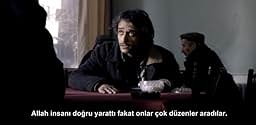Kosmos
- 2009
- Tous publics
- 2h 2min
Ajouter une intrigue dans votre langueA strange man with otherworldly talents becomes both a friend and a pariah in a small Turkish town in this drama from writer and director Reha Erdem. Yahya is nearly in a panic when his youn... Tout lireA strange man with otherworldly talents becomes both a friend and a pariah in a small Turkish town in this drama from writer and director Reha Erdem. Yahya is nearly in a panic when his young son falls into the river on a wintry day and looks lifeless when he's pulled from the wa... Tout lireA strange man with otherworldly talents becomes both a friend and a pariah in a small Turkish town in this drama from writer and director Reha Erdem. Yahya is nearly in a panic when his young son falls into the river on a wintry day and looks lifeless when he's pulled from the water.
- Réalisation
- Scénario
- Casting principal
- Récompenses
- 16 victoires et 10 nominations au total
Avis à la une
Through the masterful camera-work we follow the main character Kosmos (remarkable performance by Sermet Yesil) as he wanders through the snow-laden wilderness in eastern Turkey. His presence has a prominent role in the villagers lives, lives that are so wrapped up by borders and boundaries, real and imaginary, that never have come to grasp their true selves.
The strength of the film largely benefits from the expressive performances from all of the cast. Thank you Reha Erdem and everyone involved with this spellbinding film for restoring my faith in Turkish cinema.
I think this is one of those movies in which the theme is so complex (philosophical) that even the actors can't get it. A good movie needs to have a good story that can be followed by an average audience ,and needs to have mind challenging subtext for more complex viewers. In case sub text precludes the story, I'd say it might be a better idea to write a philosophical book ,since such a load of ideas can not be gotten across audience via a movie through two hours. Second, movies must have story , when the subtext comes in the first place in terms of importance, this also obliterates the reason for making a movie.
Reha Erdem's Kosmos is a rare film that exhilarates the spirit. Unclassifiable, it's best placed in one of those niches set aside for oddball jewels. Not a perfectly cut diamond – it digresses here and there and could be slightly trimmed – but a highly polished one nevertheless. Its hero Battal, who calls himself Kosmos, is brilliantly brought to life by Sermet Yesil. Yesil crafts him into one of the strangest and most endearing characters to emerge out of recent cinematic history. Quirky and intense, with a sub-layer of sadness that seems to reflect the suffering of the world.
The film begins with his dramatic entry into the Turkish city of Kars, in eastern Anatolia, near the Armenian border. Erdem takes his time with the opening scenes: gripping and feverish, against a palette of sounds and snowscapes, they set the film's tone and prefigure its ending. Battal is a distant figure engulfed by a wintry landscape, running fearfully from unseen pursuers as he downs a snow-covered hill towards the river that runs through the city. He hears a young woman calling for help as she runs along the bank after the body of her brother, floating downstream in rushing water. After hiding a wad of bills (stolen?) under a rock, Battal pulls the child out of the water. In a wild frenzy of hugs, cries and rolling about, her brother is resuscitated. The beautiful young woman (Türkü Turan), who claims the boy was dead, finds instant affinity with Battal, and decides to call herself Neptune.
Battal is then received as a hero by the locals and the neighborhood café owner offers him room and board for the menial job of clearing tables. The film recounts the events that occur as he shirks the job, steals money (which he mostly gives away) and roams the city, trying to alleviate the suffering of his fellows.
It is soon clear that this stranger is a man of uncanny powers and otherworldly connections. Drawing his febrile energy from no more than sugar lumps and tea, he shimmies up trees like a feline and emits birdsong as he leaps, swings or flies (we never really see) from branch to branch. In one shrilling, virtuoso scene with Neptune, we get a flashing glimpse of his (their?) feet turned into those of a bird and of Battal walking upside down across a ceiling.
His presence deregulates clocks, he claims to have been to Alpha Centauri and he has the power to heal, though not infallibly. A child he cures of muteness falls ill and dies, and the brittle school teacher he beds and cures of migraines jumps to her death. The film only drops hints as to why some healings fail and Battal seems as perplexed as we are.
Battal's Kosmos never preaches, but gladly spouts his obtuse philosophy, spiked with homespun homilies, when questioned. He lauds the virtues of eschewing work and the delights of uniting soul and body in erotic love. When this boils down to spending a night of love with Neptune, her father stubs a cigarette out on his hand, but no matter, the burns vanish overnight.
Other things are happening. There are huge and disturbing close-ups of cattle destined for slaughter. Mundane activities such as bringing in the geese are charged with ominous foreboding. But foreboding of what? A satellite that falls from space seems connected to Battal, but how? The film continually suggests that events are taking place at other levels, with deeper significances than meet the eye, but what are they? All of this is helped along by the film's exceptionally effective sound design and soundtrack, used as powerful mood enhancers, generating tension as the pace accelerates, giving rise to expectations of impending disaster, but does it ever come?
Mysteries and loose ends abound at the end, most of all the identity of the elusive Battal. But the film's tight structure, centering on Battal and the Kars neighborhood, easily keeps the film from overloading As in Lynch, Kosmos is best experienced through emotional connections and recognitions than through reasoning. But while Lynch peels off layers of psyche to reveal our beasts within, Erdem quite happily relegates everything to the macrocosm. At the film's end, he whirls us upwards on an exhilarating ride deep into the real cosmos, where sheer awe tends to make any need for explanation seem paltry. In this film's magical way, everything comes harmoniously together in this joy ride to the stars, music crescendoing to the point of explosion.
Altruistic thief, loopy star man, hybrid human – let's just say that Battal is blessed with unearthly powers that invite us to revel in the strangeness of the world. The film also invites reflection on marginality, tolerance and the meaning of freedom. For Battal is the bothersome man in the timeless tale of the other, the intruding visitor who rattles the social and moral order, pointing at their contradictions and hypocrisy. The status quo will never accommodate him, and he hightails it out of Kars just as he came in – this time running up the snowy hill, a tiny dot lost in the wintry landscape, with the police hot on his trail for thieving and basic "undesirability".
A neat subtext emerges when a right-wing activist makes the rounds, drumming up support to oppose proposed measures to open the border with Armenia, in an effort to stimulate trade. Suspicious, he questions Battal about the nature of his visit. Battal replies only that he is an "unexpected guest". Disarmed, the hunky xenophobe can only utter back "welcome".
That's what we should say too after seeing this exuberant film, teetering on the brink of a minor masterpiece.
The film opens with inhuman howling winds whirling round and round over a white wintry snows-cape, and on its rounds the wind returns (Eccles 1.6), snowing the whole world over, shifting to night, with its hoary silver-gray sky menacing a vacant snows-cape, shifting to day again, a pure argent white snows-cape undisturbed and unperturbed by a background speck of movement, a lone feral-like man running breathlessly, at full speed towards white nothingness, wailing at whatever he's left behind - a vast boundless vacant snows-cape of white nothingness. But then the run ends at the snowed-over cliff, and he takes in the view, right out of an impressionistic painting: the outline of a snow-swept medieval town sculptured by the blizzard and hewed right out of the rocks of the valley, domes and spires of trees and serpentine roads completing the vista. The wind echoes, the sound of emptiness reverberates across all the corners of the earth, synclastically returning to this medieval town, hallowed out of the stones of the earth.
The man, among rocks, a whirling wine dark river tessellating impartially alongside him as he takes a knotted mess of money out his shoe. Catacoustical, tintinnabulation sounds of nature and mechanical melt into each other: fermenting water and crunching snow and echoing rocks spectral intersecting with distant sounds of machinery and battle. A young girl, howling a wail, and the man, abandoning his wealth to the rocks, runs responds to the call: he runs into the ferocious slate ice waves to save a child drifting unconscious in the water. Breathing the child back into life, he then collapses, his winded breathing the sound of a wounded animal.
Cross-cut of the moon: representing the cyclical movement of day and night, the moon (and sun) is prime evidence in nature of the repetitive cyclical character of reality (Ecclesiastes), a notion that is a radical challenge to the conception of time and sequence inscribed in Genesis and elsewhere in the Bible, where things are imagined to progress meaningfully towards fulfillment. Trademark of Reha Erdem: the moon, a stationary indifferent dazzlingly bright spherical ornament, obnubilated and obtenebrated by pillars of clouds and the impenetrable murky blackness of night. Then we hear a cow's heated, guttural mooing, moans from the bowels of the earth, and brightly-lit circular clocks whose hands are stuck, stuttering, no forward motion, and looks almost as if the hands are trying to move counterclockwise.
Battal, a prophet, a wild, feral man with a wondrously mellifluous voice flowing with honey, trilling ululations like a wolverine, his veriloquence enrapturing the townspeople just as Ecclesiastes has enraptured listeners and readers for over fifteen-hundred years. Most of his dialogue straight out of Ecclesiastes, a few bits come from the Book of Job and Song Of Songs. I must segue into Ecclesiastes for a moment, before returning to the film.
Howling wolves and cawing birds and whirling water and tintinnabulations of bullet spray ricochet against a ululating Battal chasing the girl, the masculine and feminine are primitive and hymnal and delightful and sensual and fierce and stimulating as the sun and the moon and the river.
Pieces of music by A Silver Mt. Zion rake through certain scenes like sunlight (or G-d's light...), the music a golden threnody of weltschmerz, the musicality evincing the sadness over the evils of the world that encapsulates the sum total of the mood of the film and the director's mindset as he was composing this cinematic masterwork.
A wanderer, hero, a prophet, a wild animal, a mute, a bully, what next? Astral sounds jettison and we see thin cow legs deep in the snow, heated gutturals reminding us of slaughter, and like lighting, a visual of short wave sci-fi sound: circuitously tinseling the tenebrous blackness of night, Saturn's Rings, meteor trails, a time-exposure of millions of car lights streaking by fast in the black of night, spiraling galaxies, and then a plain, a deserted lunar plain ontologically blanked by the consuming expanse of an impenetrable black sky, catch your breath as a city of the plain, formed of fallen stars, shimmers and twinkles across the horizon, a radiating band of light trumping the ineluctably of dark.....
And this is just the beginning.
Battal preaches to any and all, chases after three women, performs miracles, self-heals his cigarette burn, spirits out the infernal cough of an ailing old tailor, pleasures the teacher out of her migraines, guilts the boy who stole money from him into speaking again after being mute for a year), steals money to pay for sustenance but also gives the stolen money to others in need, howls like an animal in pursuit of Neptune, scales trees and roars ferociously and religiously peregrinates through the squalid, run down streets of the town where rabid dogs prowl and where buildings are vacant empty shells. Battal, wanderer, foreigner, hero, radical prophet, thief, wild animal, lover, healer, hedonistic, generous.
Kosmos (2010) laments the lack of faith that afflicts our modern world and the contemporary human, the lack of faith in existence, nature, humankind, the interconnectedness of the world.
Battal's dialogue is directly lifted from, in film order, Ecclesiastes 9:2-9:5, Ecclesiastes 3:16-3:20, Ecclesiastes 2:20-2:26, Song Of Songs (Solomon) 4:13-4:15, Song Of Songs (Solomon) 6:10, Ecclesiastes 11:2- 11:3, Ecclesiastes 7:29, Ecclesiastes 4:9-4:10, Ecclesiastes 4:11, Ecclesiastes 5:2, Job 15:14, Job 22:14
and it had a symphony concert affect to my ears. I cannot articulate what else to say about that. defining sound is as hard as defining the taste of an apple.
however, a director should always bear in mind that having a wonderful visuality and delightful sound necessarily suggest a wonderful film. I understand that this movie tries to separate itself from the rest with claiming that it has some issues to share, it wants to show you people something and do not want to make these so obvious because it is afraid of being a mainstream trash with its storytelling.
but this kind of an approach also bears the risk of being an outcast which limits the number of theaters that wants to screen it because the movie has the risk of not being understood since it avoids the traditional storytelling. therefore director's complaints about not being able to find a big number of theaters is meaningless when a director sets out for this. there is no way that this kind of festival movies will get closer to 100 000 viewers.
To conclude, wonderful photography, frantic sound but a weak plot and storytelling which leaves everything all over the place and above all such a weak script (which makes you think that it was intentional but I did not feel that) ends up to this. max 7 thousand viewers and a discouraging step for the following filmography. (for the director, for the producers, for the theater and most importantly for the viewer.)
Le saviez-vous
- AnecdotesTürkü Turan's debut.
- Bandes originalesStumble Then Rise On Some Awkward Morning
Performed by Thee Silver Mt Zion (as A Silver Mt. Zion)
Constellation Records & Rough Trade Publishing Ltd
Meilleurs choix
- How long is Kosmos?Alimenté par Alexa
Détails
Box-office
- Montant brut mondial
- 79 914 $US
- Durée
- 2h 2min(122 min)
- Couleur
- Mixage
- Rapport de forme
- 2.35 : 1





















